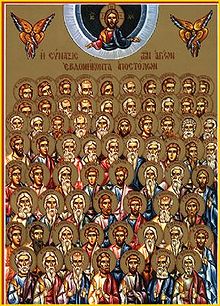Seventy disciples | |
|---|---|
 Icon of the Seventy Apostles | |
| Disciples | |
| Venerated in | |
| Canonized | Pre-Congregation |
| Feast | 4 January (Eastern Orthodoxy) |
| Attributes | Scroll Cross |
The seventy disciples (Greek: ἑβδομήκοντα μαθητές, hebdomikonta mathetes), known in the Eastern Christian traditions as the seventy apostles (Greek: ἑβδομήκοντα απόστολοι, hebdomikonta apostoloi), were early emissaries of Jesus mentioned in the Gospel of Luke. The number of those disciples varies between either 70 or 72 depending on the manuscript.
The passage from Luke 10 in the Gospel of Luke, the only gospel in which they are mentioned, includes specific instructions for the mission, beginning with (in Douay–Rheims Bible):[1]
And after these things the Lord appointed also other seventy-two: and he sent them two and two before his face into every city and place whither he himself was to come.
In Western Christianity, they are usually referred to as disciples,[2] whereas in Eastern Christianity they are usually referred to as apostles.[3] Using the original Greek words, both titles are descriptive, as an apostle is one sent on a mission (the Greek uses the verb form: apesteilen) whereas a disciple is a student, but the two traditions differ on the scope of the words apostle and disciple.
- ^ Luke 10:1–21
- ^ Catholic Encyclopedia: Disciple: "The disciples, in this disciples, in this context, are not the crowds of believers who flocked around Christ, but a smaller body of His followers. They are commonly identified with the seventy-two (seventy, according to the received Greek text, although several Greek manuscripts mention seventy-two, as does the Vulgate) referred to (Luke 10:1) as having been chosen by Jesus. The names of these disciples are given in several lists (Chronicon Paschale, and Pseudo-Dorotheus in Migne, P.G., XCII, 521–24, 543–45, 1061–65); but these lists are unfortunately worthless."
- ^ "Synaxis of the Seventy Apostles". oca.org.